21/11/2019 | Category: Home Insurance

Many people dream of one day owning a holiday home. It’s a special place for friends and family to congregate, and a potentially lucrative investment that helps boost retirement funds.
Sometimes, however, it’s fun to step outside your comfort zone. With the rise in popularity of alternative retreats such as yurt holidays and glamping, it’s no surprise that three in 10 domestic vacationers intend to spend more of their holiday time on home soil this year – there’s so much to do.
Perhaps you want to maintain a second home and still enjoy the occasional alternative trip. A holiday home can be a smart long-term investment, so it shouldn’t be ruled out.
If you’re put off by the thought of overseeing another property, remember: quality cover is out there. Insurance Choice understands what a headache finding reliable holiday home insurance can be, so we do the hard work for you, sourcing the right protection suited to your specific needs.
We’re big fans of holidays, too, so take a look at some of the best holiday home alternatives and consider your options – we’re here to help!
What alternatives are there to buying a holiday home?
From wild to wacky, there are so many accommodation options available for holidaymakers. Let’s take a look at some of the most popular right now.
Yurts
Originally used by Nomads to shelter from long, cold winters, yurts are portable and durable tents popular across the globe. Bamboo/wood rafters and latticework are covered with canvas, traditionally in a circular structure, with a dome skylight in the centre.
In recent years, yurts have become part of the glamping trend. Their interiors are often customised; some are draped with bright, patterned fabrics, others have more pared back, neutral palettes.
Many festival goers hire them, opting for larger yurts with the ability to sleep lots of friends or family together. Couples planning romantic getaways often gravitate towards yurt rentals, as they’re an affordable alternative to pricier retreats, with the added romance of sleeping under canvas thrown in!
Yurts can be found grouped on specialised glamping grounds, often amidst stunning natural beauty. There are also many individual yurt rentals, where one solitary yurt is set up on a country estate’s grounds or a farm, for example, enabling guests to have a little slice of nature all to themselves.
While yurts don’t tend to come equipped with bathrooms or kitchens, most will come with nearby facilities available for guests to use. In the UK, yurts commonly include one or more beds and a wood burning stove, keeping things cosy, warm and toasty.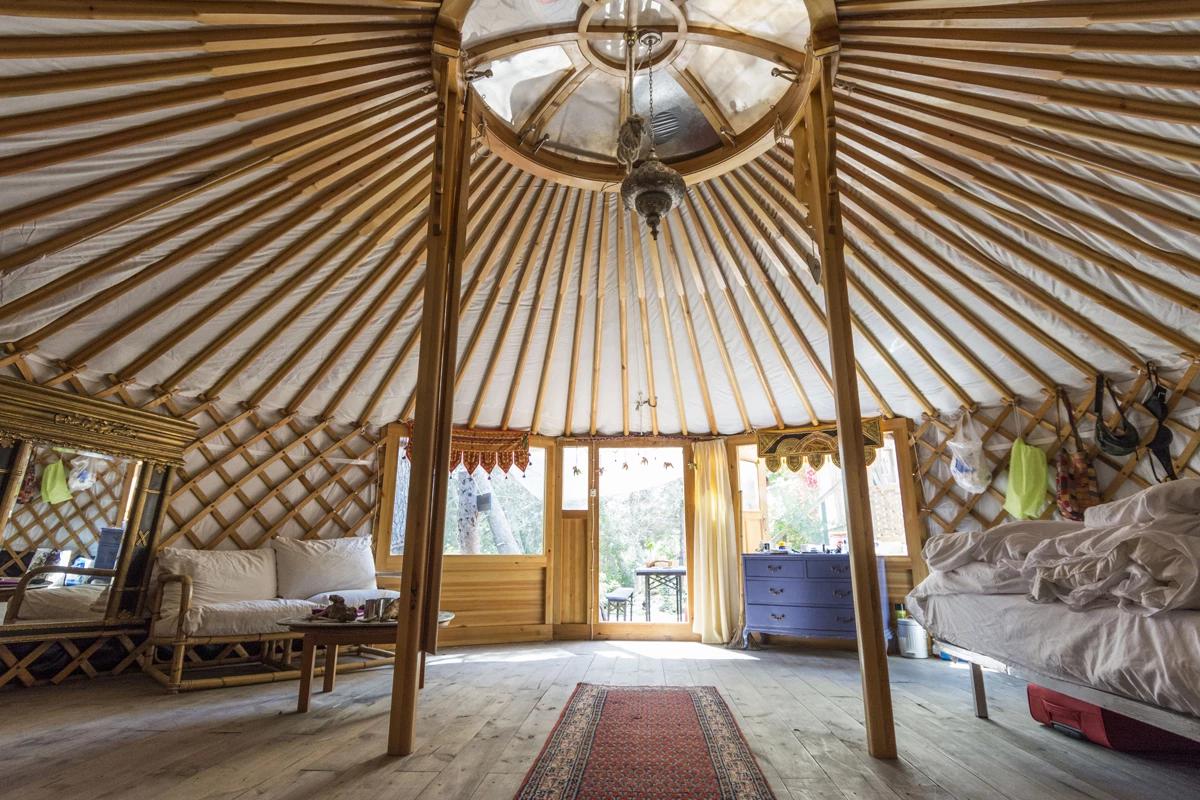
How much does it cost to rent a yurt?
Prices start at around £85 a night for yurt rental, dependent on the time of year and quality of yurt. Luxury yurts will cost considerably more, often coming with hot tubs and optional extras such as cooking courses or gourmet meals.
Cabins and shepherd’s huts
Shepherd’s huts were historically used by shepherds watching over their flocks. A traditional shepherd’s hut tends to have a corrugated iron roof and walls, and sits upon iron wheels.
They’ve been upgraded significantly in recent times, offering a great alternative to yurts for those who miss creature comforts. Nowadays, they’re often stylish additions to people’s gardens or stretches of private land, clad in attractive wooden cladding and smartly decorated inside.
Modern bathrooms, kitchen facilities and a plush, spacious interior are now commonplace among luxury shepherd’s huts. They still incorporate charming traditional features, but they’re designed to offer indulgent yet affordable getaways, set within beautiful scenery.
Cabins provide a similar experience, but their sizes and shapes are more versatile. Like shepherd’s huts, they capture old-world charm, often placing a modern twist on it, with all the latest gadgets and gizmos on hand.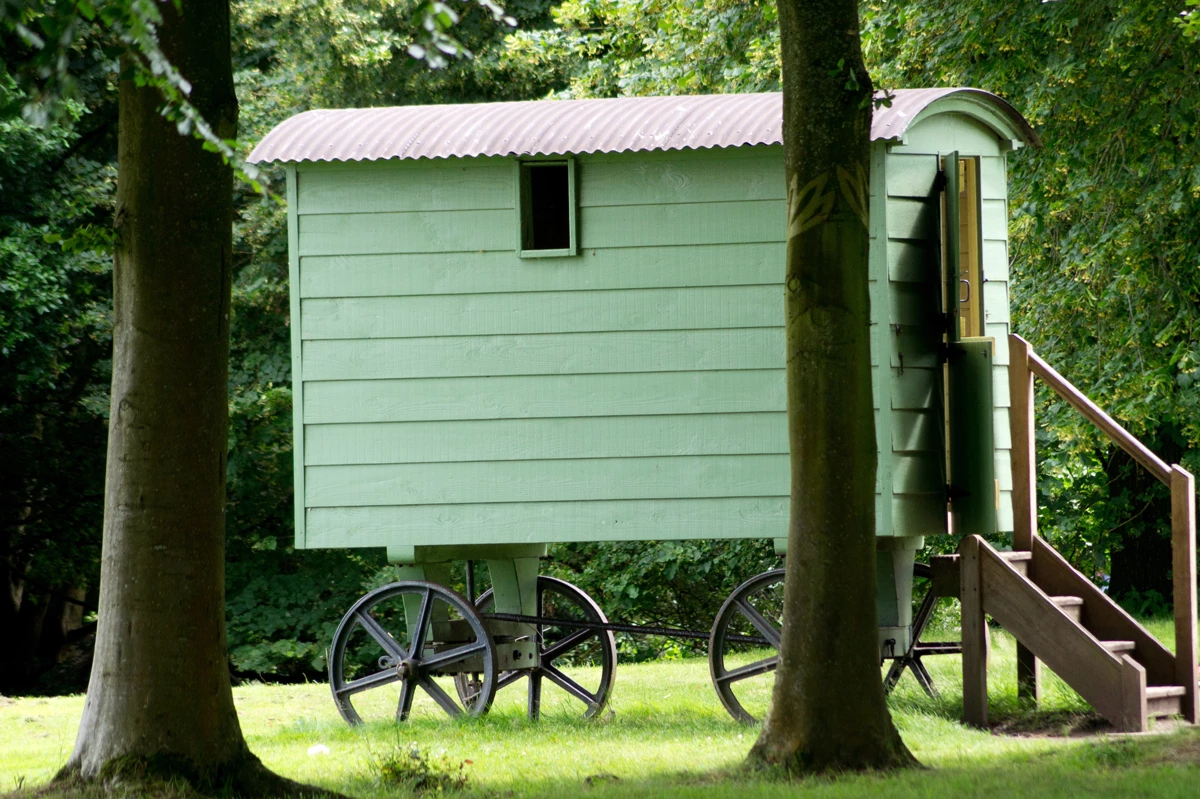
How much does it cost to rent a cabin or shepherd’s hut?
Shepherd’s huts and cabins range from high-end to basic, so if you’re after no-frills fun in the countryside, you can find accommodation for a little as £30 a night. A luxurious hut or cabin in a sought-after location such as the Cotswolds will cost significantly more.
Houseboats
Houseboats, or ‘boatels’, are a wonderful way to break the holiday mould and embrace a fresh, water-borne experience. From canal barges to luxury boats, these peaceful retreats enable guests to get away from it all, giving direct access to a river, lake or beach.
The UK has a phenomenal network of waterways, ideal for scenic canaling trips. Guests can drift through a breath-taking array of landscapes and regions, stopping off at pubs for hearty meals and drinks.
Nature lovers will treasure time spent cruising across lakes, lochs and rivers, seeing wildlife up close and in action. An urban mooring is a budget-friendly way to take in iconic cities from new and interesting angles, from sunrise to sunset – all from the comfort of your own private houseboat.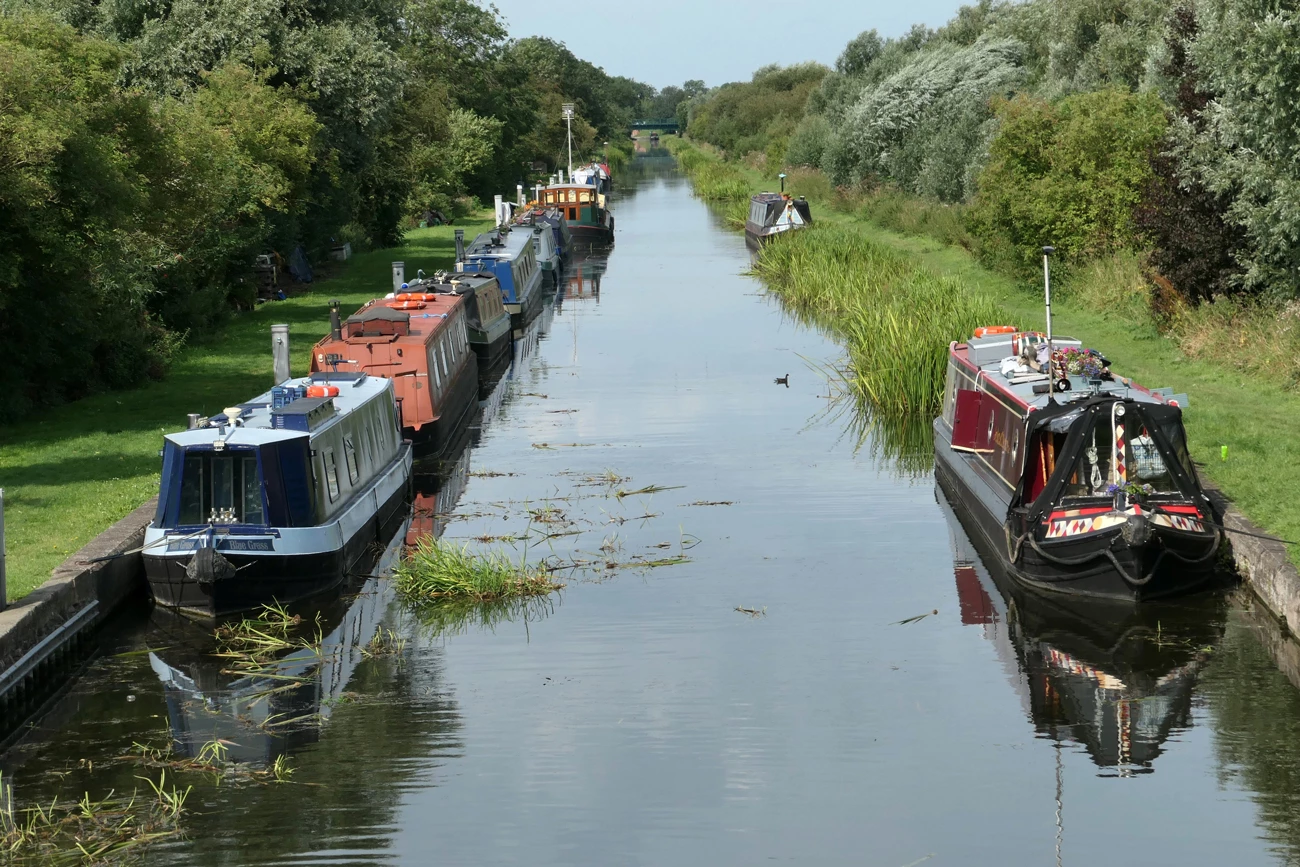
How much does it cost to rent a houseboat?A week in a houseboat can cost as little as £300, dependent on season and location. If you opt for a more luxurious boat in a hotspot such as London, you’ll be paying a heftier price.
Treehouses
Fancy panoramic views coupled with quirky accommodation? Try renting a treehouse for the week. Holiday treehouses are by no means basic – in fact, they’re often stunning architectural gems boasting remarkable craftsmanship.
It’s one thing to stay in an area of great natural beauty; it’s quite another to enjoy it from high up above. Luxury treehouses are dotted all across the UK, so you can take in the wild wonder of the Scottish Highlands or coastal glory of the Isle of Wight – it’s up to you.
They often come decked out with comfortable beds, Freeview TV, fully equipped kitchens and wood-burning stoves. Bathroom facilities tend to stand separately, but you can still enjoy treats such as walk-in rainfall showers and bubble baths.
A treehouse allows guests to truly immerse themselves within nature, up in the trees, taking in the morning chorus and scope of the surrounding landscape. Quite a few also provide decking areas, so you and your companion can enjoy candlelit meals for two, set against an amazing backdrop.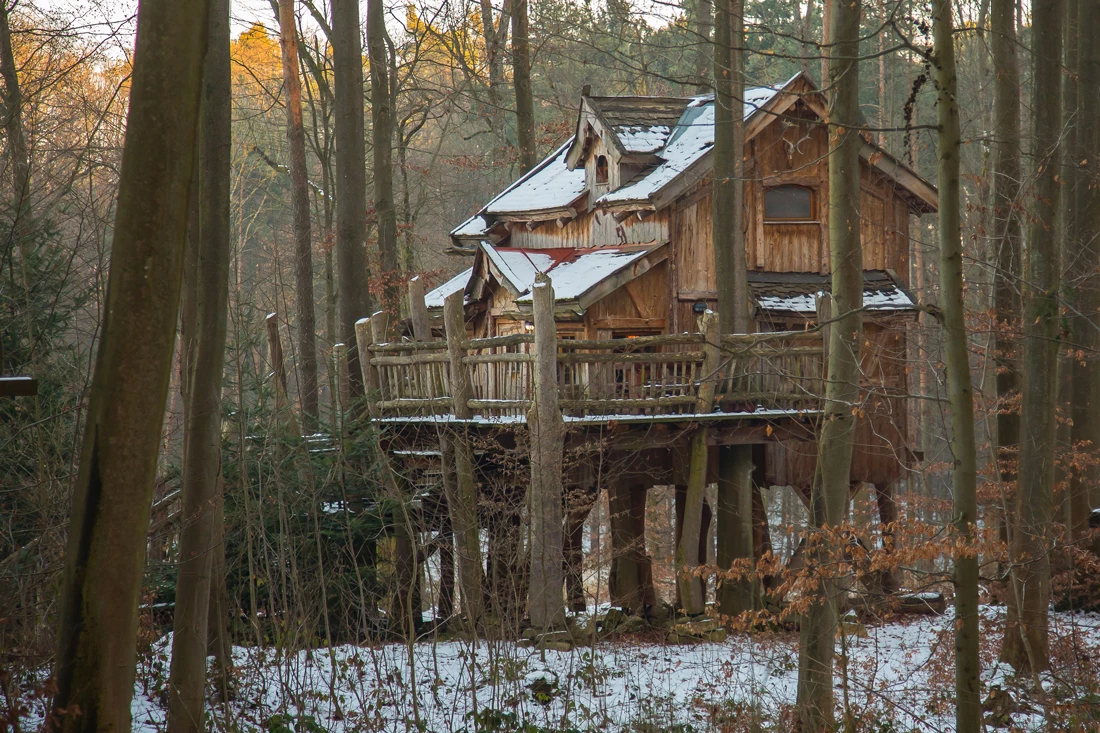
How much does it cost to rent a treehouse?
A basic treehouse will cost about £40 a night, but if you want the luxury experience, you’ll likely be paying three times that amount at least.
The pros and cons
Holidaying in alternative accommodation has its perks and its drawbacks. While a second home takes up considerable time and investment, in the long run it can be a real asset, so it’s worth weighing up the pros and cons attached to both travel options.
A total change of scene
Sometimes a drastic change of environment is needed. Going to the same place every year can become dull and boring – it’s nice to broaden your horizons now and then.
Staying in alternative accommodation enables you pick and choose where and when you go away, giving you a flexibility holiday home ownership doesn’t allow for.
With a second home you’ll have to work around guest bookings, only using it when it’s unoccupied, which may not suit your schedule.
New experiences and people
Most of us get to know our neighbours and local hotspots, so it’s likely the same will apply if you own a second home. You’ll want to foster good relationships with nearby residents, as when you’re absent it’s reassuring to know you have trusted friends watching over your property. Securing reliable holiday home insurance is essential, too.
Staying in alternative accommodation means you’ll get to meet new people, see new places, and get a break from the daily routine. Whether you’ve rented a yurt in Wales or a houseboat in Edinburgh, you’ll be able to soak up all that a new locale has to offer, taking in different cultural highlights and customs.
Minimal stress
For some, a second home is a headache, demanding extra time and energy. While watertight holiday home insurance and good accounting helps, the potential issues caused by factors such as the weather, guests and crime means many are put off purchasing a holiday home.
On the other hand, a getaway to a quirky cabin with a hot tub requires minimal effort – all you have to do is show up. Someone else will be responsible for tax, maintenance and upkeep, you can simply relax and make the most of a laidback getaway.
Affordable luxury
Five-star hotels are unlikely to disappoint, but not all of us can afford them. There’s nothing worse than working hard to save up for a trip, only to arrive at an unclean budget hotel, that’s more than a little worse for wear.
Alternative options such as shepherd’s huts or treehouses enable those with a tight budget to enjoy a taste of the luxury lifestyle. While you may not be in a Parisian suite, you can still enjoy sumptuous décor, beautiful surroundings and welcoming hosts – not too shabby!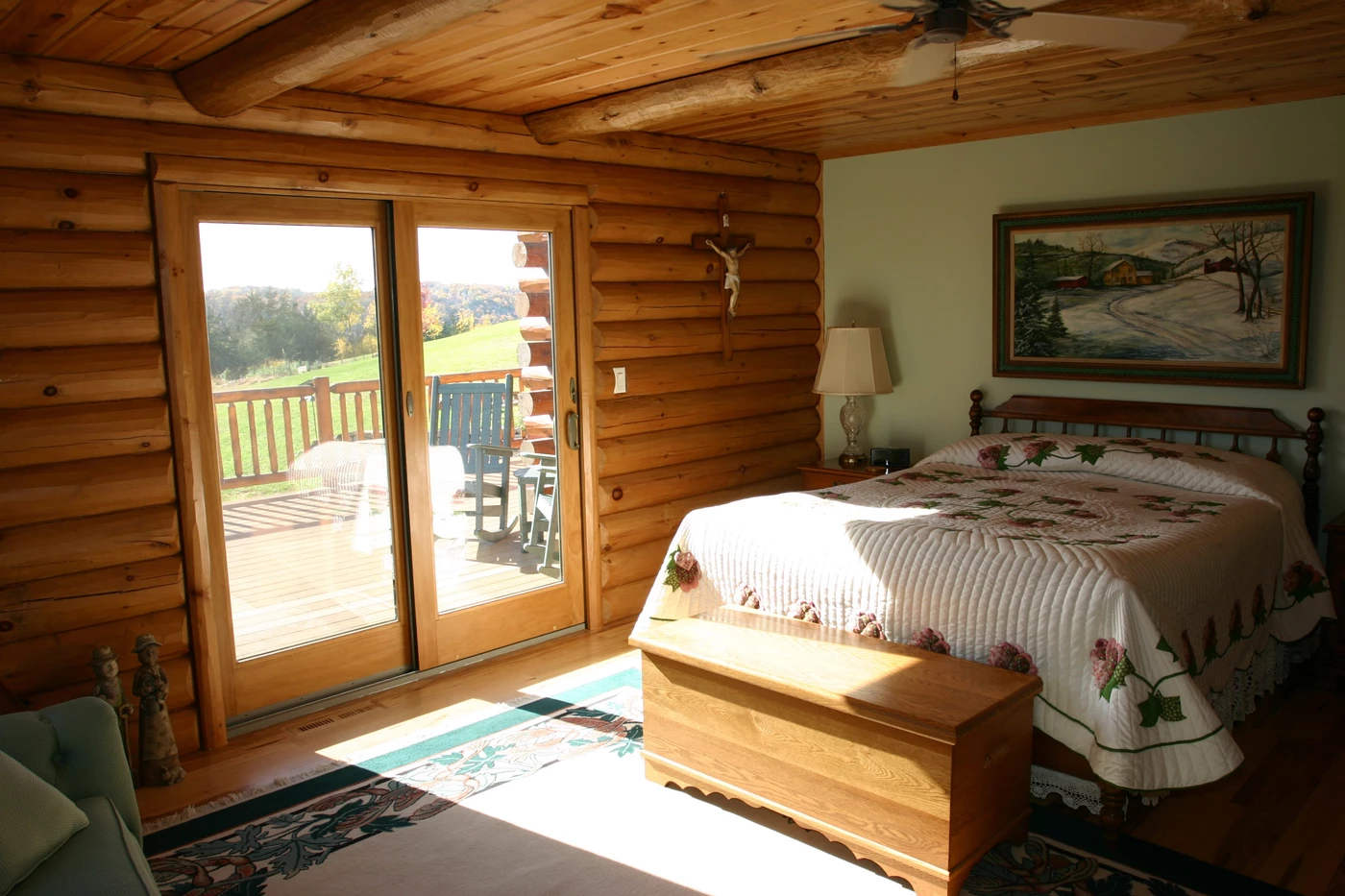
Impersonal accommodation
One of the drawbacks of rented getaways is the lack of personalisation. Unlike a second home, your accommodation cannot be significantly tailored to your tastes and specifications.
We all have personal preferences when it comes to our sleeping quarters – some of us prefer a firm mattress, others like memory foam. Even elements as subtle as scent can be divisive within homes. You may arrive to find your holiday cabin perfumed by a strong room fragrance, one that turns your stomach or gives you a week-long headache.
A holiday home is truly yours, so you can decorate it accordingly. You can store favourite clothes, books and mementos there, hanging your most treasured photos and paintings, while burning your favourite oils. There’s something to be said for home comforts.
Risk of disappointment
We’ve all been there: the photos look great, the reviews are glowing, but you don’t get quite what you expected. Maybe there’s a screaming baby on a nearby houseboat, noisy teenagers camping out in the area or an unclean bathroom.
It’s hard to predict potential problems when staying in new, alternative accommodation. You’re unlikely to know the area well, so you may not have the usual tricks up your sleeve, either. If you own a second home, you’ll get to know the layout of the area, finding faster, less congested routes to take when visiting and learning how to get that stiff front door open.
A holiday is meant to be a treat, as well as a time for relaxation, so it’s hard to cope with disappointment.
Drain on finances
While it costs money to run and manage a holiday home, long-term it can prove highly valuable. Your money will be invested in property – almost always a safe move – and you have the potential to rent it out to paying guests. As long as you follow the law and secure quality holiday home insurance, it’s unlikely you’ll regret purchasing a second home.
Renting an alternative retreat puts you in the position of the paying customer. You’ll be spending money you could be saving, and if you hope to get away in the warmer months, you’ll also be affected by seasonal spikes in price.
Lack of space
Unless you have a large budget, you’ll face a lack of space when renting alternative accommodation.
If you own a second home, you’ll have the run of the house every time you visit, should you wish. While there are plenty of wonderful houseboats, cabins and yurts available, they tend to offer limited space, so you and your companions will have less room to relax.
A second home of your own
While the UK has many fun, quirky holiday alternatives on offer, owning a holiday house has considerable perks. Not only will you have your own, personalised getaway, you’ll profit at the same time - Visit Britain forecast 38.9 million inbound tourist trips in 2019, so business should roll in.
Of course, you can never rule out risks to your investment such as theft or damage. A guest may suffer an injury while staying at your retreat, leaving you liable – this is why holiday home insurance is so important. Insurance Choice specialise in finding quality cover, tailored to your specific needs and budget.
Enjoy your second home and have peace of mind – get a quote today.
